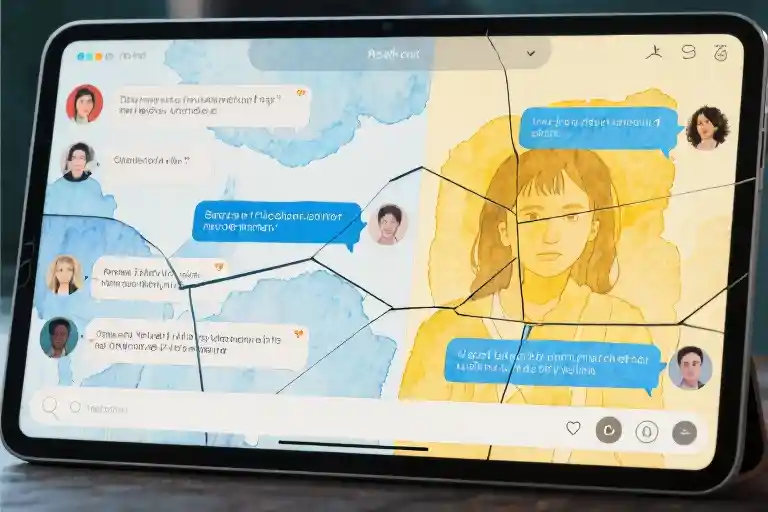The clock glows 3:07 AM in the quiet dark. Again. That familiar tightness grips your chest as you stare at the ceiling, mentally tallying every misstep from the past week—the unfinished project, the awkward conversation, the promises you couldn’t keep. A silent courtroom convenes in your mind, where you’re both the accused and the merciless judge.
Outside, the world sleeps. But here, beneath the weight of invisible expectations, you’re wide awake. It’s in these hushed hours that the questions creep in: Why can I extend grace to strangers yet withhold it from myself? Why does compassion flow freely to others but freeze solid when I turn it inward?
This isn’t just another sleepless night. It’s the manifestation of something deeper—the cultural myth that worthiness is earned through flawless performance. We’ve been conditioned to believe self-criticism is motivational, that tearing ourselves down will somehow build us up stronger. But neuroscience tells a different story: chronic self-judgment activates the same threat response in our brains as physical danger, flooding our systems with cortisol while shrinking our capacity for resilience.
Consider this moment your permission slip. A reminder that the most profound revolutions begin in the quiet—in the space between one ragged breath and the next. You don’t need another list of productivity hacks or positive affirmations that ring hollow. What you need is to hear this truth, perhaps for the first time without caveats:
You are allowed to be a work in progress.
That project you’re stressing over? It doesn’t define your intelligence. That strained relationship? It isn’t proof of your unlovability. Those dreams that feel increasingly distant? They’re not measuring sticks for your worth. The common thread in all your perceived failures isn’t inadequacy—it’s your breathtakingly human attempt to navigate an imperfect world with an imperfect self.
Tonight, as the moonlight traces patterns across your blanket, try this instead: Place one hand over your heartbeat. Feel its stubborn rhythm—this primal evidence of your aliveness that continues unabated despite your self-doubts. That pulse isn’t waiting until you ‘fix’ yourself to keep time. It honors you exactly as you are in this moment: scarred, striving, enough.
Because here’s what they don’t teach in hustle culture seminars: The healthiest form of motivation grows from self-compassion, not self-flagellation. A 2022 Cambridge study found that individuals practicing self-kindness showed 23% greater persistence after failure compared to those engaging in negative self-talk. Turns out, treating yourself like someone you love doesn’t make you soft—it makes you scientifically more likely to get back up.
So tonight, let’s rewrite the script. When your mind replays that cringe-worthy moment from Tuesday’s meeting, add this director’s commentary: ‘Ah yes, the scene where I courageously risked being human in public.’ When anxiety whispers that you should have everything figured out by now, remind it that even sequoias grow one ring at a time.
The great paradox? The moment you stop punishing yourself for being unfinished is when real growth begins. Not because you’ve suddenly become perfect, but because you’ve finally created enough psychological safety to stretch beyond your comfort zone. As psychologist Kristin Neff observes: ‘A plant can’t thrive while being uprooted daily for inspection.’
Dawn will come soon enough with its to-do lists and responsibilities. But for now, in this suspended hour between darkness and light, practice the radical act of resting as you are. Not the idealized version of yourself you’re ‘supposed’ to be. Just you—the beautifully imperfect human who woke up today and is still trying, still breathing, still worthy of kindness.
Let that truth settle into your bones. Then close your eyes. Tomorrow can wait.
The Weight You Carry
Your phone buzzes with another late-night email as you rub your temples. That familiar pressure builds behind your eyes – not just from screen fatigue, but from the invisible boulders you’ve been hauling since sunrise. Most wouldn’t guess that the colleague who just delivered a flawless presentation spent her lunch break crying in the stairwell. Or that the barista who remembered your usual order has been tallying his perceived failures like an internal spreadsheet.
The Science Behind Self-Punishment
When we chronically criticize ourselves, our bodies respond as if facing physical threats. Cortisol levels spike 37% higher during self-criticism compared to compassionate self-talk (University of Texas, 2022). This biochemical reality explains why:
- Morning self-reproach lingers like muscle soreness
- Perceived failures trigger actual fatigue
- Mental replay of mistakes disrupts sleep cycles
Your nervous system can’t distinguish between a predator attack and your inner voice hissing “You should have worked harder.” The physiological toll manifests in clenched jaws, shallow breathing, and that leaden sensation behind your breastbone – literal weight from metaphorical burdens.
High-Functioning Struggle: The Checklist
You might be masking emotional labor if you recognize these 7 subtle signs:
- Polished exterior, chaotic interior – Calendar color-coded while thoughts spiral
- Productivity guilt – Rest feels like stealing time
- Emotional math – Calculating appropriate reaction sizes
- Micro-apologies – “Sorry for rambling” after two sentences
- Stealth recovery – Bathroom stall breathing exercises
- Comparative suffering – “Others have it worse” as self-silencing
- Physical tells – Nail beds chewed raw, tension headaches
“I lead boardroom discussions while digging nails into my palm under the table,” shares Michaela, 34. “The pain grounds me when I’m dissociating from anxiety.” Like many high achievers, she’s mastered the art of performing wellness while privately tallying shortcomings.
The Myth of the Unbroken
Society romanticizes resilience as linear – climb, conquer, repeat. But human psychology operates in seasons. Consider:
- Trees strengthen at their injury sites (dendrology research)
- Kintsugi pottery highlights breaks with gold
- Muscle grows during recovery, not exertion
Your fractures don’t disqualify you from wholeness; they’re proof of engagement. That client presentation you agonized over for weeks? The very anxiety sharpening your preparation demonstrates care, not inadequacy. Those 3am wakefulness episodes? Your mind working through solutions, not punishing you.
Lightening the Load
Begin transferring weight from shoulders to shared ground:
- Body scan – Notice physical tension without judgment (tense shoulders? shallow breath?)
- Reality check – Separate factual consequences from projected catastrophes
- Permission slip – Write then destroy: “I release the need to…”
- Micro-connection – Text one person: “Today was hard because…”
Like overpacked luggage, we often carry what others could help bear. That report deadline feels less crushing when you admit needing an extension. The parenting guilt eases when you confess to another mom that yes, sometimes you hide in the pantry eating chocolate.
Every “I’m struggling” whispered aloud weakens shame’s grip. Your worth isn’t measured by how gracefully you carry burdens, but by the courage to occasionally set them down.
The Light in the Broken Places
That crack in your favorite coffee mug? The one you glued back together with gold lacquer? It tells a story the original piece never could. This is the essence of kintsugi — the Japanese art of repairing broken pottery with gold, treating breakage as part of an object’s history rather than something to disguise.
What if we applied this philosophy to ourselves?
The Science of Scars
Research from the University of Pennsylvania’s Positive Psychology Center reveals something extraordinary: 70% of trauma survivors report positive psychological changes, a phenomenon called post-traumatic growth. Your neural pathways aren’t just damaged by hardship — they’re remodeled. Like trees developing stronger roots after storms, your brain builds new connections through adversity.
This isn’t toxic positivity. The data shows real transformation:
- Enhanced resilience: Repeated exposure to manageable stress increases emotional tolerance
- Deeper relationships: Vulnerability often leads to more authentic connections
- Renewed purpose: 58% of participants discovered new life paths after loss
Rewriting Your Inner Critic
Let’s try an exercise. Finish these sentences:
- “I should have known better when…” → “I was doing my best with what I knew then, which was…”
- “I’ll never get over…” → “This changed me, and I’m learning to…”
- “Why am I so weak for…” → “It took strength to…”
See how the energy shifts? Your scars aren’t proof of damage — they’re evidence of healing. That anxiety you battle daily? It’s the same nervous system that kept your ancestors alive. The perfectionism you curse? It likely helped you survive difficult environments.
The Alchemy of Pain
Consider these three perspectives on your struggles:
| Old Narrative | Scientific Lens | Kintsugi Perspective |
|---|---|---|
| “I’m broken” | Neural remodeling in progress | Gold-filled cracks increase value |
| “I can’t trust again” | Hypervigilance as protective mechanism | Each fracture teaches discernment |
| “I’ll never be the same” | Post-traumatic growth emerging | The repaired version holds more wisdom |
Clinical psychologist Dr. Sarah Thompson notes: “We mistakenly equate healing with returning to some ‘before’ state. True recovery means integrating the experience into who you’re becoming.”
Your Turn: The Mending Journal
- Identify one fracture: Choose a current struggle (work failure, relationship wound, etc.)
- Trace its edges: Without judgment, describe how it changed you
- Find the gold: List three unexpected strengths it revealed
- Design your kintsugi: How might this become part of your valuable history?
“The world breaks everyone, and afterward, some are strong at the broken places.” — Ernest Hemingway
When you catch yourself thinking “I should be over this by now,” remember: ceramics take weeks to repair properly. Human hearts need seasons. Your pauses aren’t setbacks — they’re the necessary drying time between layers of gold.
That voice whispering “you’re damaged goods”? It’s wrong. You’re upgraded goods. Every repaired piece carries the artisan’s fingerprints. Your healing bears the marks of grace.
Permission to Rest: The Healing Begins
The 5-Minute Self-Compassion Meditation
Find a quiet space where you won’t be interrupted. Set a gentle timer for five minutes. Begin by placing one hand over your heart and the other on your belly – this physical anchor reminds you that compassion starts with acknowledging your humanity.
Step 1: Grounding (1 minute)
Close your eyes and breathe normally. Notice:
- The weight of your body against the chair
- The texture of your clothing against your skin
- The temperature of the air entering your nostrils
“This is me, right here, right now. No need to change anything.”
Step 2: Affirmation (2 minutes)
Whisper these phrases slowly, pausing after each:
- “May I be kind to myself in this moment”
- “May I accept this struggle as part of being human”
- “May I give myself the compassion I’d offer a dear friend”
If your mind wanders to self-criticism (“I’m doing this wrong”), gently return to the hand on your heart.
Step 3: Body Scan (1 minute)
Move your awareness through areas that hold tension:
- Jaw → “Let go”
- Shoulders → “Release”
- Stomach → “Soft”
Step 4: Closing (1 minute)
Open your eyes slowly. Before returning to your day, ask: “What small act of kindness can I offer myself in the next hour?” Maybe it’s drinking water, stretching, or simply pausing before responding to an email.
Building Your Support System: Start With One Safe Person
Healing doesn’t happen in isolation. Create your support network with this practical roadmap:
Tier 1: Your Emotional First Responder (Week 1-2)
Identify one person who:
☑️ Listens without immediately problem-solving
☑️ Respects your boundaries when you say “I just need to vent”
☑️ Doesn’t use phrases like “You should be over this by now”
Action: Send them this text: “I’m working on being more open about my struggles. Would you be comfortable being my go-to person sometimes? No pressure to have answers – just need a caring ear.”
Tier 2: The Practical Helpers (Week 3-4)
Add 2-3 people who assist with tangible needs:
- The coworker who covers for you during therapy appointments
- The neighbor who walks your dog on tough days
- The friend who sends “no reply needed” check-in texts
Tier 3: The Inspirational Witnesses (Ongoing)
These don’t need to be close relationships:
- A support group member whose recovery journey inspires you
- A mental health professional
- Even an author/podcaster whose words resonate
Pro Tip: Create a “Support Menu” in your phone notes listing who to contact for specific needs (e.g., “When I feel worthless → text Sarah”, “When overwhelmed → call crisis line”).
When Rest Feels Like Failure: Overcoming Guilt
The Lie: “Productivity = Worthiness”
The Truth: Rest is resistance against a system that profits from your exhaustion.
Try These Mindshifts:
1. Reframe Rest as Recovery
Instead of: “I’m being lazy”
Tell yourself: “I’m recovering from 27 years of overachieving” (adjust timeframe accordingly)
2. The Permission Slip Technique
Write down:
“I, [Your Name], give myself permission to [specific rest activity] for [time period] because [true reason].”
Example: “I give myself permission to nap for 30 minutes because my body fought off a migraine this morning.”
3. Guilt Journaling
When rest anxiety strikes, complete these sentences:
- “What I’m really afraid will happen if I rest is…”
- “The origin of this belief is…” (e.g., parents praising only perfect report cards)
- “A more compassionate truth could be…”
4. Set Up Rest Alibis
For those who struggle with unstructured downtime:
- Schedule “meetings” with yourself in your work calendar
- Tell colleagues/family you’re “in a deep work session” when actually reading fiction
- Use productivity language if it helps: “I’m optimizing my cognitive functioning”
Remember: The discomfort of resting when you’re conditioned to overwork is like muscle soreness after starting exercise – it means growth is happening.
Your Healing Toolkit
For Immediate Relief:
When Ready to Go Deeper:
- The Gifts of Imperfection by Brené Brown (Chapter 3: “The Things That Get in the Way”)
- Rest Is Resistance by Tricia Hersey
Tonight’s Small Step:
Before sleep, place both hands over your heart and whisper: “You did enough today.” No qualifications, no exceptions.
Closing Thoughts: Permission to Breathe
You’ve walked through these words carrying invisible weights—the kind that leave no marks on your skin but etch themselves into your bones. Maybe you recognized yourself in the quiet struggles, the relentless self-questioning, or the exhaustion of performing “okay” when nothing feels okay.
Here’s what I need you to know before we part:
The Light That Remains
Love persists. Not the flashy, dramatic kind from movies, but the steady glow of:
- Morning sunlight through your curtains after a sleepless night
- A friend’s text that says “No need to reply—just know I’m here”
- Your own hand resting gently over your heart when the world feels cold
Hope flickers differently for everyone. For you right now, it might look like:
- Drinking water when you’d rather skip it
- Deleting that self-critical note on your phone
- Letting one tear fall without wiping it away immediately
Your Gentle Assignment
Tonight, try this instead of scrolling or ruminating:
- Pause where you are (bed, couch, bathroom floor—all valid)
- Place your right hand over your heart center
- Whisper these words slowly: “This is hard, but I’m staying. I’m learning.”
No performance reviews. No gold stars needed. This is between you and your resilient, tired, magnificent self.
When You Need More
Remember these lifelines exist without judgment:
| Support Type | Immediate Resources | Long-Term Anchors |
|---|---|---|
| Crisis Help | National Suicide Prevention Lifeline (Call 988) | Therapist directories like Psychology Today |
| Daily Tools | Calm Harm (Urge management app) | Self-Compassion Workbook PDF |
| Community | r/CPTSD or r/MomForAMinute subreddits | Local NAMI support groups |
The Last Truth
You were never meant to be unbreakable. Those cracks? They let the light in—and let your authentic self out. The door to rest, to help, to imperfect healing stays open whenever you’re ready to walk through.
“You are enough” isn’t a destination. It’s the oxygen mask you forget to use while helping others with theirs. Breathe it in now.





